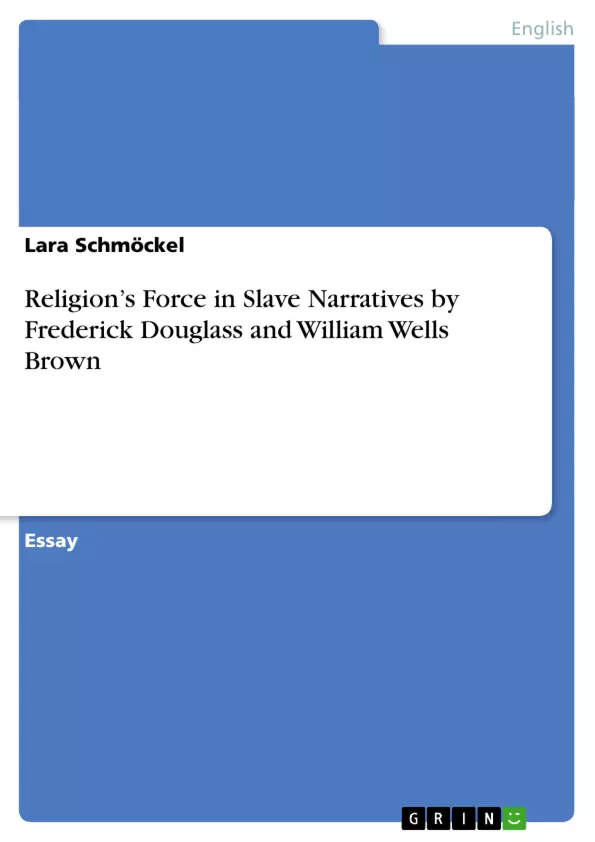In both narratives, Narrative of the Life of Frederick Douglass, an American Slave by Frederick Douglass, and Narrative of William Wells Brown, a Fugitive Slave by William Wells Brown, religion has a predominantly negative impact: it justifies the violent manner the slaveholders and overseers use to control their slaves.
Religion’s Force in Slave Narratives by Frederick Douglass and William Wells Brown
In both narratives,Narrative of the Life of Frederick Douglass, an American Slaveby Frederick Douglass, andNarrative of William Wells Brown, a Fugitive Slaveby William Wells Brown, religion has a predominantly negative impact: it justifies the violent manner the slaveholders and overseers use to control their slaves.
First of all it will be demonstrated religion’s positive force. Even though the negative characteristics of religion predominate in both texts, certain positive aspects can be found. Therefore, the positive aspects will be analyzed first.
According to Douglass, he practices the “real”, “true” and positive form of Christianity that he characterizes as “good, pure, […] holy” (Douglass, p. 398) religion and as well as “the Christianity of Christ” (p. 397). The issue of “wrong” religion will be analyzed in more detail later. Furthermore, Douglass is, although being a slave, convinced that God will salvage him and give him power and strength. For him it is important to reveal that religion is being abused by the slaveholders, but his own sincere and peaceable religion keeps him grounded and helps him not to fall into total despair, not even in situations of entirely hopelessness. He never renounces God or says any mean word about him: “Is there any God? […] Yes! God helping me, I will [try to escape]” (p. 360).
William W. Brown also describes a situation during his flight that gives him strength. He was able to survive due to “[…][God’s] providence […], [that] saved [him] from freezing to death […]” (p. 98). Similar to Douglass’ attitude towards religion, Brown also has deep belief and trust in God, despite being enslaved.
Apart from trust in and reliance on God, Douglass explains that the slaves sing a song as “a prayer to God for deliverance from chains” (Douglass, p. 324) in order to encourage one another. In addition, Brown gives an example of a song in which slaves cry out to God for freedom:
[…] O, gracious Lord! when shall it be,
That we poor souls shall all be free?
Lord, break them Slavery powers—
will you go along with me?
Lord, break them Slavery powers,
go sound the jubilee […] (Brown, p.51, third verse).
It is obvious that the slaves ask the Lord to break the slavery powers in order to free them, to help them and of course, to assist them on their further paths. So the slaves’ belief and faith in God is presented by their songs.
[...]
Frequently Asked Questions
How is religion portrayed in the narratives of Douglass and Brown?
Religion is portrayed as having a predominantly negative impact, as it was used by slaveholders to justify violence and control.
Does Frederick Douglass distinguish between different types of Christianity?
Yes, Douglass distinguishes between the "real, pure" Christianity of Christ and the "wrong" religion practiced by slaveholders.
How did faith help the enslaved people according to these narratives?
Faith provided power, strength, and hope, preventing total despair even in situations of extreme suffering.
What role did songs play in the religious lives of slaves?
Songs served as prayers for deliverance from chains and as a way for the community to encourage one another.
What specific example of God's providence does William Wells Brown mention?
Brown describes a situation during his flight where he believes God's providence saved him from freezing to death.
- Quote paper
- Lara Schmöckel (Author), 2012, Religion’s Force in Slave Narratives by Frederick Douglass and William Wells Brown, Munich, GRIN Verlag, https://www.grin.com/document/231589



